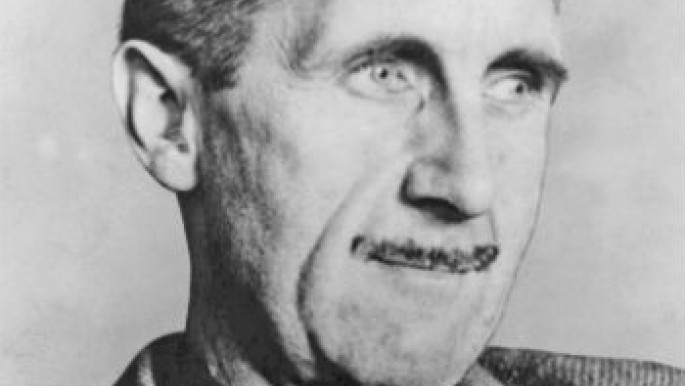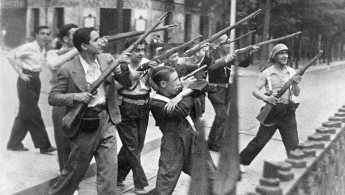Arabs on both sides of the Spanish civil war
It is a bleak and sad period in Spanish history. Eighty years ago, General Francisco Franco launched a military uprising against the elected Republican government. There is still no national museum here dedicated to telling the full story of the civil war - a war which cost so many lives, and which split the country apart.
The Arab involvement in this brutal conflict is also poorly documented; it is complex and painful for many of the living relatives of those involved.
Emiterus Professor Sebastian Balfour is an expert in Spanish history and its colonial past.
"The majority of Arabs [directly involved] were on Franco's side; 80,000 or so troops were brought over from Morocco," he told The New Arab.
They were known as Regulares as well as "the army of Africa". The question is what motived Moroccans who had been subjected to brutal colonial suppression to cross the straits of Gibraltar and fight in a foreign land?
The answer lies in the colonial history of Morocco, according to Professor Balfour. There was strong opposition to the colonisers from the Rif area of Northern Morocco, led by Muhammad ibn 'Abd al-Karim al-Khattabi - popularly known as Abdelkrim.
"Abdelkrim led the very competent struggle to unify different tribes," says Professor Balfour.
What many people don't know, says Balfour, is that Spain became the first power to use chemical weapons, including mustard gas, as an aerial weapon against civilians. They could not defeat the rebels by conventional means, so they dropped the deadly gas into villages and souks.
It appears that the motivation for the horrific chemical attacks was revenge for the defeat of the Spanish Army of Africa and their Moroccan recruits at the Battle of Annual on July 22, 1921. Around 13,000 Spanish and colonial soldiers died in that battle, which led to a political crisis and a change in Spanish colonial policy towards the Rif region.
The Association for the Defence of Victims of the Rif War says the toxic effects are still being felt in the Rif region, but no scientific study has yet proven the link between chemical weapons and the high rate of cancer in the area.
Balfour notes "it is a paradox" that a population which was dealt with so brutally were willing to fight for their oppressors.
Most of the soldiers recruited by Franco in the Spanish Civil War were not from the Rif area, and Franco was able to ingrain his Fascist ideology among the Regulares, as well as the Legionarios. He promised good salaries and help for soldiers' families.
 |
|
| Writer George Orwell famously joined the ranks of the International Brigades fighting Franco [AFP] |
"The Moroccan troops involved felt they were fighting a jihad against atheists and communists. Another motivation was money, and gaining a foothold in the [Iberian] peninsula," says Professor Balfour.
To exacerbate the hatred of the Moroccan recruits towards the Republicans, Franco's men emphasised the "brotherhood" between the people of Morocco and the Spanish, while accusing their opponents of being "godless atheists";"enemies of all civilised people".
But Arab fighters were not just to be found among the ranks of Franco's rebels.
Supported by Hitler and Mussolini, Franco had risen up against Spain's Republican government in 1936. In response, thousands of men and women from around the world travelled to Spain, forming "The International Brigades", to fight his forces of fascism.
There remains little research into the role of Arabs among their ranks.
One of the most prominent members of the International Brigades was Najati Sidqi, a leading figure in Arab and Palestinian communism. In his memoirs he spoke of encouraging Arabs to form a brigade of their own:
"So I said to myself: truly, there is no excuse for excluding the Arabs from volunteering. Are we not also demanding freedom and democracy? Would not the Arab Maghreb be able to achieve its national freedom if the Fascist generals were defeated?
"Would the defeat of the Italian fascist forces at the hands of the popular democratic Spanish forces not lead to the salvation of Arab Tripoli from the clutches of the tyrant Mussolini?"
While the impact of Arabs fighting Franco was not enough to sway the result of many battles, Professor Balfour says there remains "no question" that the Moroccan colonial army was crucial in enabling Franco's victory.
"They were shock troops, there to squash the Republican fighters, and were sent to the most difficult areas," he said.
Both the Regulares and the Legionarios took the most casualties among Franco's troops. It is very difficult to estimate the numbers of dead with accuracy, but Balfour believes that around 10-12 percent of the troops were killed or injured.
The Civil War ended with Franco's victory, after he was armed and heavily backed by German and Italian Fascists. The Republican government had received limited support from the left-wing administrations of the Soviet Union and Mexico.
Some of the Moroccans who fought for Franco were allowed to settle in Spain after the war, but many were strongly encouraged to return.
In 2013, Moroccan activists set up the Center for Common Memory and the Future, to reach out to Spanish civil society to change attitudes to the past and focus on future cooperation. The centre is attempting to research the fates of Moroccans who died during the war.
However, still missing from the chapters of European history are the tens of thousands of Moroccan fighters, buried in unmarked graves across Spain - their fate unacknowledged.
Nazanine Moshiri is a freelance journalist and security expert based in Tunis. You can follow her on Twitter @nazaninemoshiri



